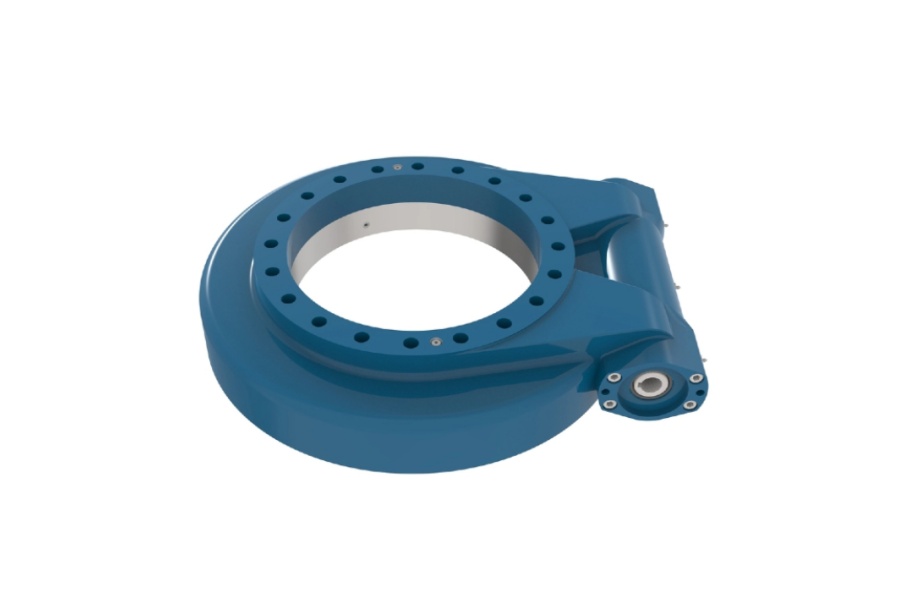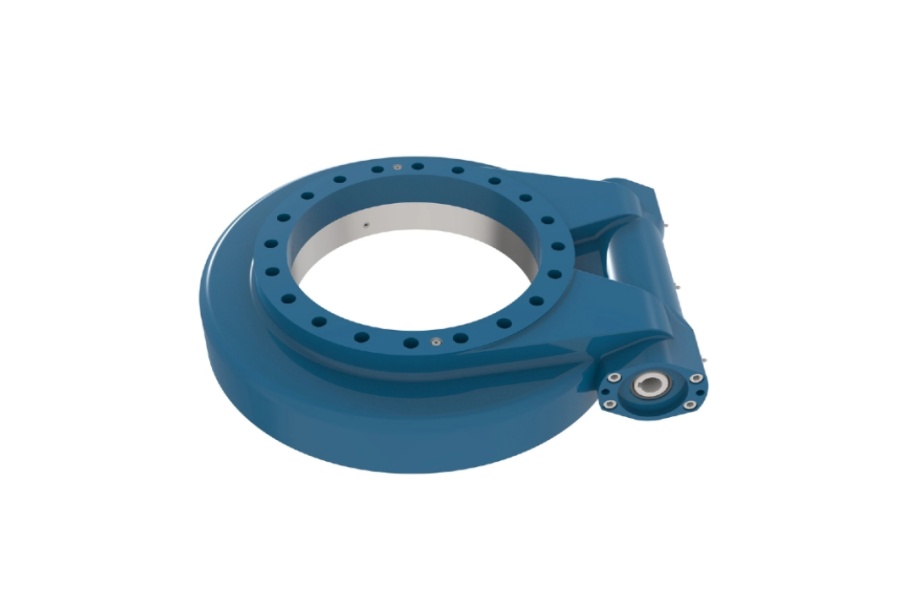
Slew Drive Structure and Materials
What is Slew Drive
Slew Drive represents an integrated power transmission system that combines a slewing bearing, gear mechanism, housing structure, and sealing system into a single compact unit. These systems provide controlled rotational movement while supporting complex load combinations, making them essential components in applications requiring both motion control and structural support. The effectiveness of a slew drive depends fundamentally on its structural design and material selection, which together determine its load capacity, service life, and environmental resistance.

Slew Drive Structure and Materials
Housing Construction Materials
Housing materials significantly impact the overall performance and application suitability of slewing drives. Cast iron remains the preferred choice for heavy-duty applications due to its exceptional wear resistance, vibration damping characteristics, and structural rigidity. Grade 250 cast iron provides excellent durability for industrial environments while maintaining cost-effectiveness. Aluminum alloys offer a lightweight alternative with superior thermal conductivity, making them ideal for applications where weight reduction and heat dissipation are critical. Aluminum housing typically utilizes 356-T6 alloy, which provides good mechanical properties and corrosion resistance. For extreme environments, stainless steel housings (typically 304 or 316 grade) offer maximum corrosion resistance despite higher material costs and reduced thermal conductivity.
Gear Materials and Manufacturing
Gear materials must withstand extreme operational stresses while maintaining precision engagement. Pinion gears commonly utilize 42CrMo alloy steel (AISI 4140 equivalent) due to its excellent combination of strength, toughness, and wear resistance. Through carburizing heat treatment, surface hardness reaches 58-62 HRC while maintaining a tough core structure. The main gear ring typically employs 42CrMo or similar high-strength alloy steel, often through induction hardening processes to achieve surface hardness of 45-50 HRC. Precision grinding after heat treatment ensures optimal tooth profile accuracy and surface finish, critical for efficient power transmission and noise reduction.
Bearing Selection and Configuration
Bearing systems form the core of slew drive performance, requiring careful selection based on operational requirements. Single-row four-point contact ball bearings provide optimal solution for applications requiring compact design while handling combined loads. For heavier load requirements, cross roller bearings offer superior stiffness and load capacity in minimal space. Three-row roller bearings represent the heaviest duty option, capable of supporting extreme loads in industrial applications. Bearing races typically utilize 50Mn or 42CrMo material with induction hardening to 55-58 HRC, ensuring maximum durability under heavy load conditions.
Shaft and Connection Systems
Input shaft designs vary based on power transmission requirements. Solid steel shafts (typically 40Cr or similar alloy steel) provide maximum torque capacity, while hollow shafts allow for passage of hydraulic lines or electrical cables. Keyway connections remain standard for most applications, while splined connections offer higher torque capacity and better alignment characteristics. Surface treatments including phosphating or nickel plating enhance wear resistance and corrosion protection.
Sealing and Protection Systems
Multi-stage sealing systems protect internal components from environmental contamination. Radial shaft seals utilizing NBR or FKM compounds provide primary sealing at rotating interfaces. Labyrinth seals offer non-contact protection against coarse contaminants, while magnetic seals provide exceptional protection in submerged applications. Housing seals typically utilize silicone or fluorosilicone compounds for temperature resistance, with static O-rings providing environmental protection at housing interfaces.
Slew Drive Characteristics
Structural Integrity
Modern slew drives demonstrate exceptional structural rigidity through optimized housing designs and material selection. Finite element analysis ensures uniform stress distribution under maximum load conditions, while reinforced rib patterns provide additional stiffness where needed. This structural integrity ensures consistent performance and maintains alignment precision throughout the service life.
Load Capacity Optimization
Through careful material selection and heat treatment processes, slew drives achieve optimal balance between surface hardness and core toughness. This enables maximum load capacity while maintaining resistance to shock loads and operational stresses. The combination of high-strength gearing and precision bearings ensures reliable performance under combined loading conditions.
Environmental Resistance
Material selections and surface treatments provide comprehensive environmental protection. Electroplated coatings, chemical conversion coatings, and specialized paint systems protect external surfaces, while internal protection comes from proper material selection and lubricant compatibility. This multi-layer protection ensures reliable operation in diverse environmental conditions.
Thermal Management
Material thermal properties and housing designs contribute to effective heat dissipation. Aluminum housings provide superior thermal conductivity for heat-intensive applications, while cast iron housings offer better heat retention in temperature-sensitive applications. Cooling fins and heat dissipation paths are incorporated into housing designs where additional thermal management is required.
Slew Drive Applications
Solar Tracking Systems
Solar applications utilize aluminum housing slew drives for weight reduction and thermal management. Precision ground gears ensure accurate positioning, while specialized seals protect against environmental contamination. The combination of lightweight construction and high torque capacity makes them ideal for solar tracking applications.
Wind Turbine Systems
Wind energy applications require heavy-duty slew drives with maximum reliability. Cast iron housings provide structural support for yaw and pitch systems, while high-strength gear materials withstand dynamic loading conditions. Specialized coatings and seals protect against weather exposure and temperature variations.
Construction Equipment
Excavators and cranes utilize heavy-duty slew drives with maximum impact resistance. Through-hardened gear materials provide wear resistance under abrasive conditions, while robust bearing systems handle shock loads and variable loading conditions. Enhanced sealing systems protect against particulate contamination in construction environments.
Industrial Automation
Robotic systems and precision machinery require high-accuracy slew drives with minimal backlash. Precision ground gears and high-accuracy bearings ensure positioning accuracy, while compact designs allow for integration in space-constrained applications. Specialized materials provide corrosion resistance in clean room environments.
What Affects Slew Drive Price
Material Costs
Material selection significantly impacts overall cost. Cast iron housings provide cost-effective solution for standard applications, while aluminum housings increase material cost by 40-60%. Stainless steel construction typically doubles material costs compared to cast iron. Gear material selection affects cost through both material expenses and heat treatment requirements, with carburized gears costing 30-50% more than through-hardened alternatives.
Manufacturing Processes
Production methods greatly influence final pricing. Gear grinding processes add 25-35% to manufacturing costs compared to hobbled gears, while precision honing and lapping operations further increase expenses. Heat treatment requirements vary significantly, with carburizing processes adding 40-60% to component costs compared to induction hardening.
Bearing Selection
Bearing quality and type majorly affect system cost. Standard accuracy bearings provide economical solution, while P4 or P5 precision grade bearings increase cost by 100-150%. Special bearing designs including cross roller or three-row configurations further elevate costs due to complex manufacturing requirements.
Sealing Systems
Sealing complexity impacts overall pricing significantly. Standard lip seals provide basic protection at minimal cost, while multi-stage sealing systems with labyrinth and magnetic seals can increase sealing costs by 200-300%. Special seal materials including FKM or PTFE compounds add 50-100% to sealing system costs.
Quality Certification
Industry certifications add substantial verification costs. ISO 9001 certification typically adds 5-10% to overall costs, while industry-specific certifications (CE, DNV-GL) add 15-25%. Nuclear or military certifications can increase costs by 100-200% due to extensive documentation and testing requirements.
Slew Drive Supplier
LYRADRIVE manufactures precision slewing drives utilizing advanced materials and manufacturing technologies. The company's product range incorporates optimized material selections for various application requirements, from standard cast iron constructions to specialized aluminum and stainless steel configurations. LYRADRIVE's engineering expertise ensures optimal material pairing for gear systems and structural components, providing balanced performance between strength, durability, and cost-effectiveness. The company maintains strict quality control throughout manufacturing processes, from material certification to final assembly, ensuring consistent performance and reliability across all product lines.



